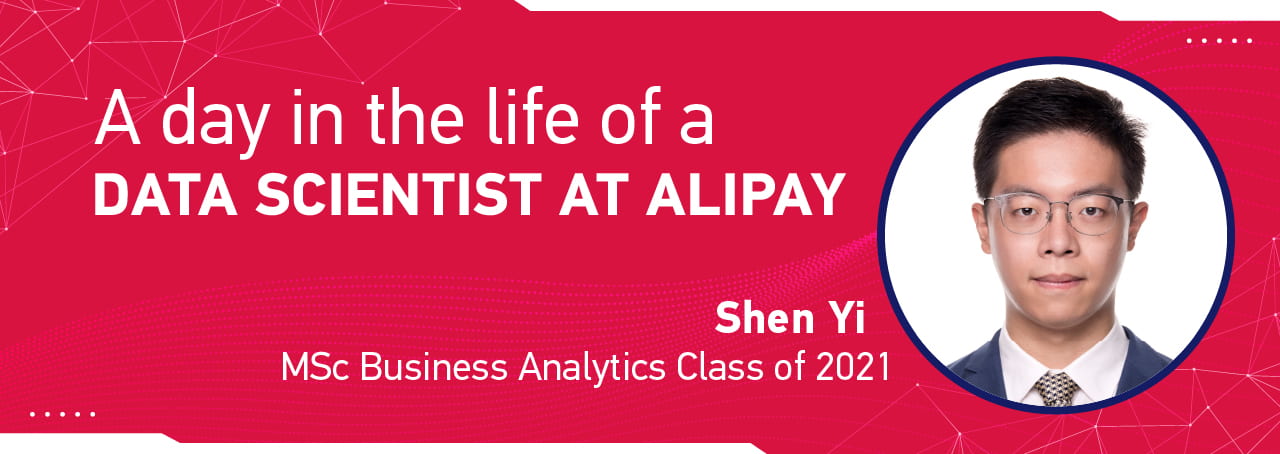Graduate Studies Blog

MSC BUSINESS ANALYTICS
A day in the life of a data scientist at Alipay: Solving complex customer problems with data analytics
Shen Yi, a data scientist for Ant Customer Experience at Ant Group, is navigating this exciting landscape. Ant Group owns Alipay—the world’s largest mobile payment platform with over 1.3 billion users and 80 million merchants.
Given Alipay’s scale and reach, one can only imagine the amount of financial and customer data that Shen Yi has to sift through daily. Take a peek into a day in his life as a data scientist, and learn how a Specialised Master’s in Business Analytics (MSBA) from Nanyang Technological University (NTU), Singapore helped kickstart his new career path.
At the cutting edge of fintech and CX innovations
As a data scientist for Ant Customer Experience, Shen Yi’s primary responsibility is enhancing customer experience (CX) and anticipating problems related to using Alipay.
He employs time series prediction to forecast when customers will call in, so that call centre staff can prepare in advance. He also uses machine learning (ML) and natural language processing (NLP) techniques to identify problems and optimise processes to assign customers to the right customer service staff.
“Rather than waiting for our stakeholders to raise problems, we try to find problems in the workflow from the perspective of data and then apply the latest algorithms and technologies to solve them,” he explains.
However, in his line of work, most of his challenges have little to do with data technologies or algorithms. Instead, his crucial difficulty is helping his different stakeholders understand the value and impact of data science.
“Not all our stakeholders know what data science can do,” he reveals. “Often, they want to solve business problems through conventional methods rather than seeking an optimised or intelligent solution.” Shen Yi has to work harder to explain processes and results to different stakeholders and find ways to present data easily.
Despite these challenges, his role keeps him excited, as he is constantly exposed to the latest technical developments in fintech and CX. Ant Group provides training camps related to large language models, optimisation, and causal inferences, which not only improves his technical skills but also broadens his views on the developments in the sector.
“It’s exciting to see how big data can play a crucial role in exposing and solving problems that are almost impossible for human to address or detect,” he shares.
And as the field grows, so does Shen Yi. “Every time I complete a new project, learn one or two new algorithms, or gain command over one or two new tools.”
Making the shift from finance to data analytics
With a background in Finance Management, a career in data analytics was a massive shift for Shen Yi. He enrolled in an MSBA from NTU’s Nanyang Business School (NBS) to make the leap.
“The programme has a solid technical curriculum,” he says. “For students like me with a Finance background, it’s important to construct a systematic understanding of big data and AI technologies. The courses on machine learning and AI taught me the principles and deductions of algorithms and how to realise algorithms with code and apply them to solve problems.”
There are many interdisciplinary electives for MSBA students, such as cybersecurity and blockchain.
As part of his data practicum, Shen Yi also spent nine months working at the e-commerce company Shopee, where he gained hands-on experience in cutting-edge fintech and CX technologies and collaborated with experienced professionals in the industry.
Technical know-how aside, his biggest takeaway from the MSBA programme is the soft skills needed to work well with others. “I think the most important skill set I learned is how to cooperate with others to solve problems,” he recalls.
During the MSBA programme, he was required to complete group assignments in almost every class. This honed his innate strengths as a data analyst and taught him how to communicate well with others, deal with conflict, and handle emergencies that may get in the way of project advancement.
“In my line of work, I am required to collaborate with product managers, operations specialists, data engineers, and software developers,” he says. “In this industry, no individual can complete a project alone—businesses thrive when thousands of intelligent brains have efficient discussions and information exchange.”
Forging new career pathways with a Specialised Master’s in Business Analytics
As Shen Yi builds his data analytics career in China, having an MSBA degree from NTU has opened doors.
“Most Chinese companies welcome graduates from NTU because of NTU’s reputation,” he shares. “It’s not very difficult for NTU graduates to find their ideal position with the knowledge they learned and the social circles they built during their stay in NTU.”
He adds that NTU’s career office has equipped him with valuable resources for employment opportunities, with some career instructors specialising in the Chinese employment market.
Despite his success, Shen Yi doesn’t rest on his laurels and maintains an objective outlook on the rapid advancements in his industry. “Being a data scientist requires a solid command of algorithm and engineering knowledge, and it’s impossible to learn everything about data science in one or two years in the programme—especially when the field is rapidly developing,” he says.
For those aspiring to a career in data analytics, Shen Yi has this advice: “Find one specific field in data science you’re interested in or particularly good at,” he says. “Data science isn’t a specific discipline and can always be applied to other fields, such as finance and healthcare. If you’re already in a field you are familiar with—coupled with a command of data science and big data technologies—you’ll surely succeed in that career path.”
Like Shen Yi, you too can forge new career pathways in data science with a Specialised Master’s in Business Analytics. This interdisciplinary programme equips students with the technical know-how and hands-on experience they need for the dynamic world of data analytics, a vital component in today’s digital-first organisations.

